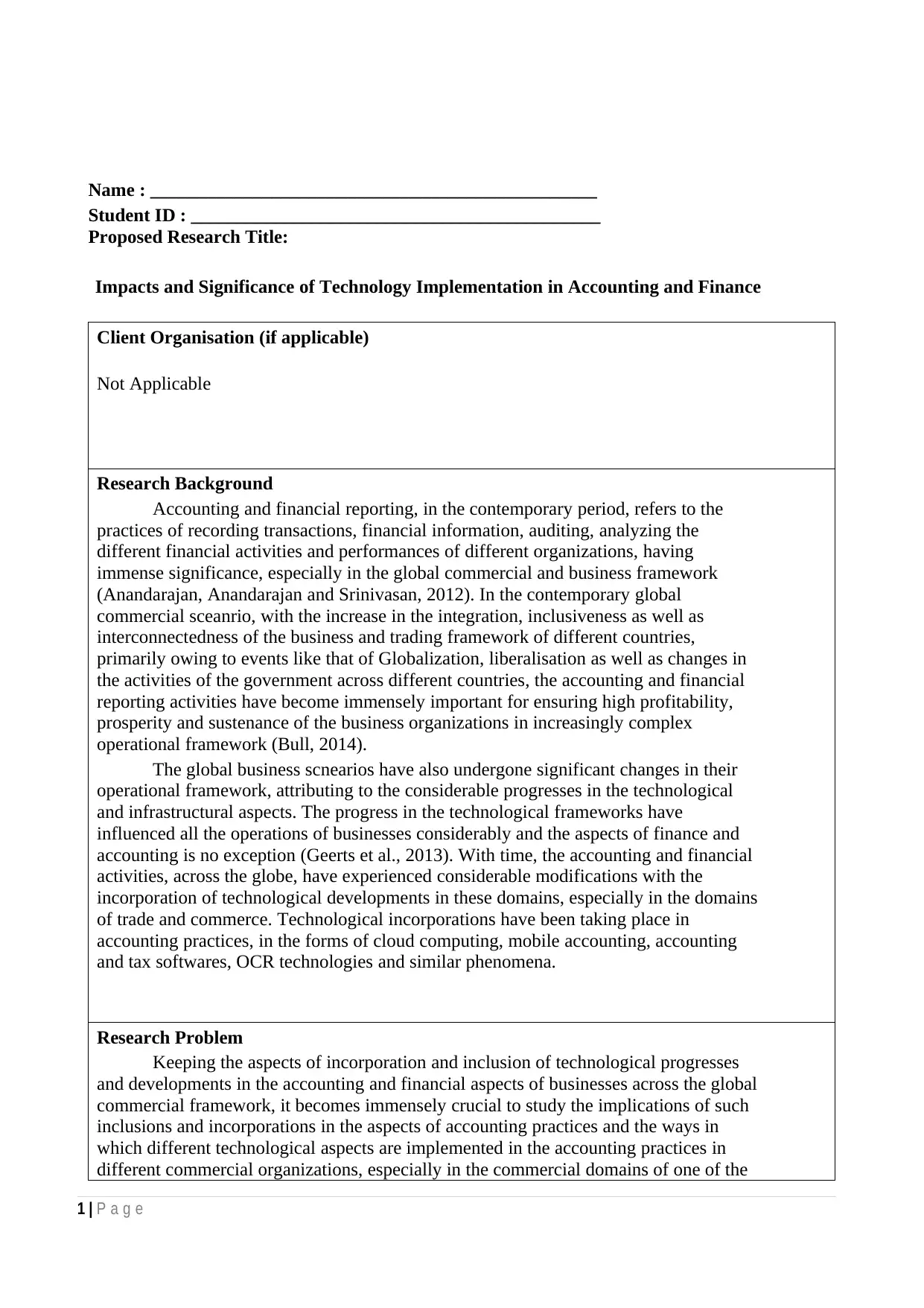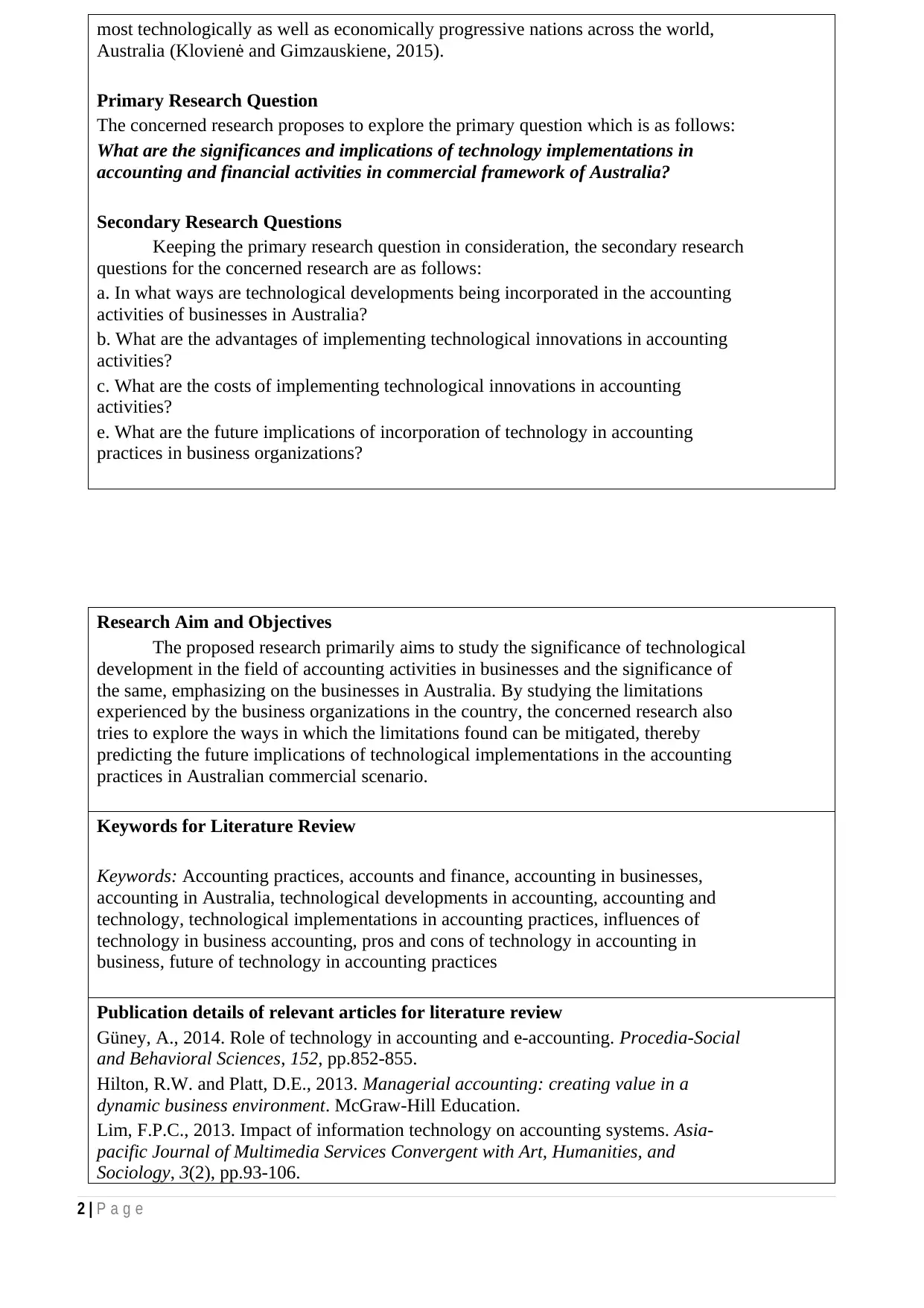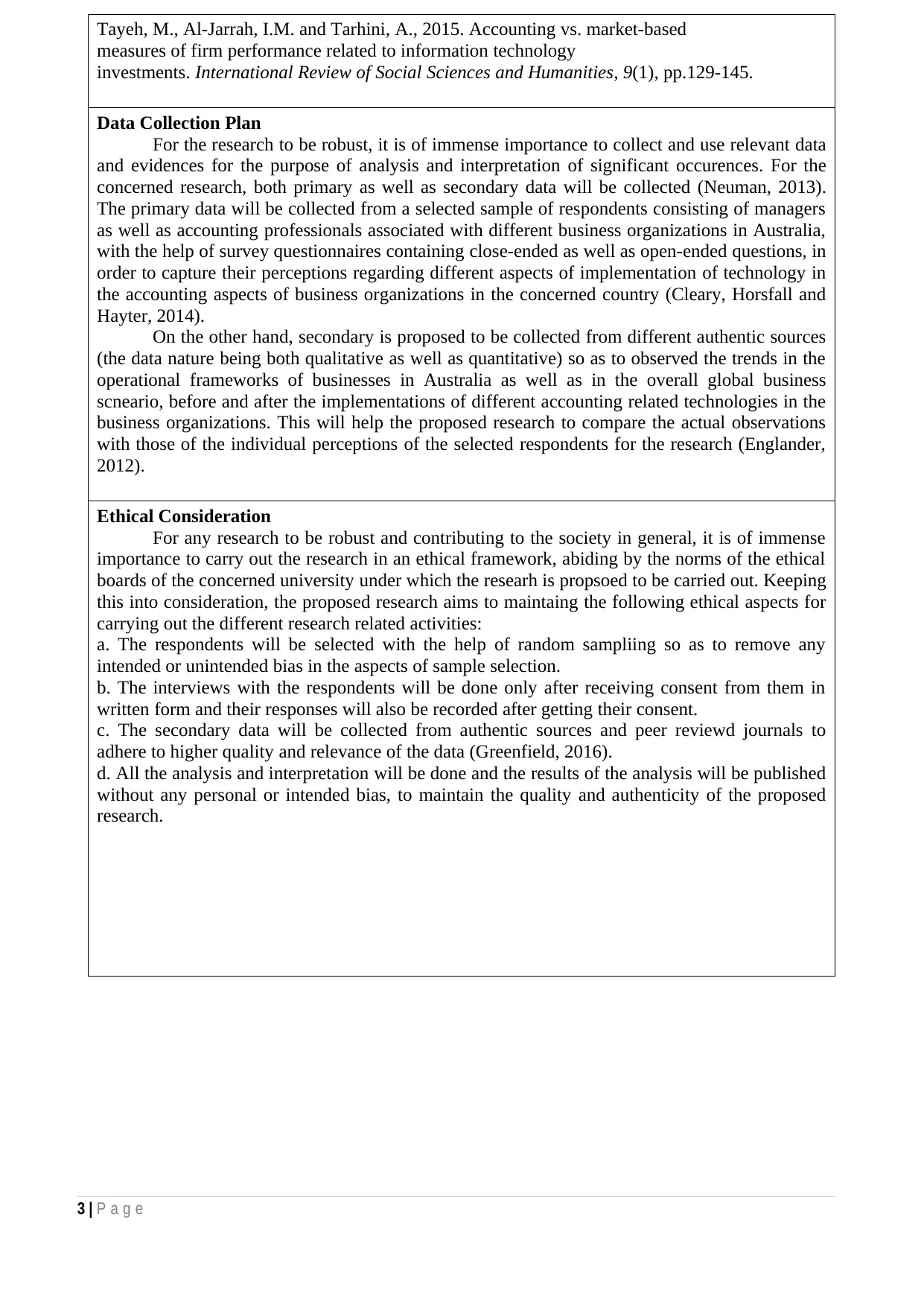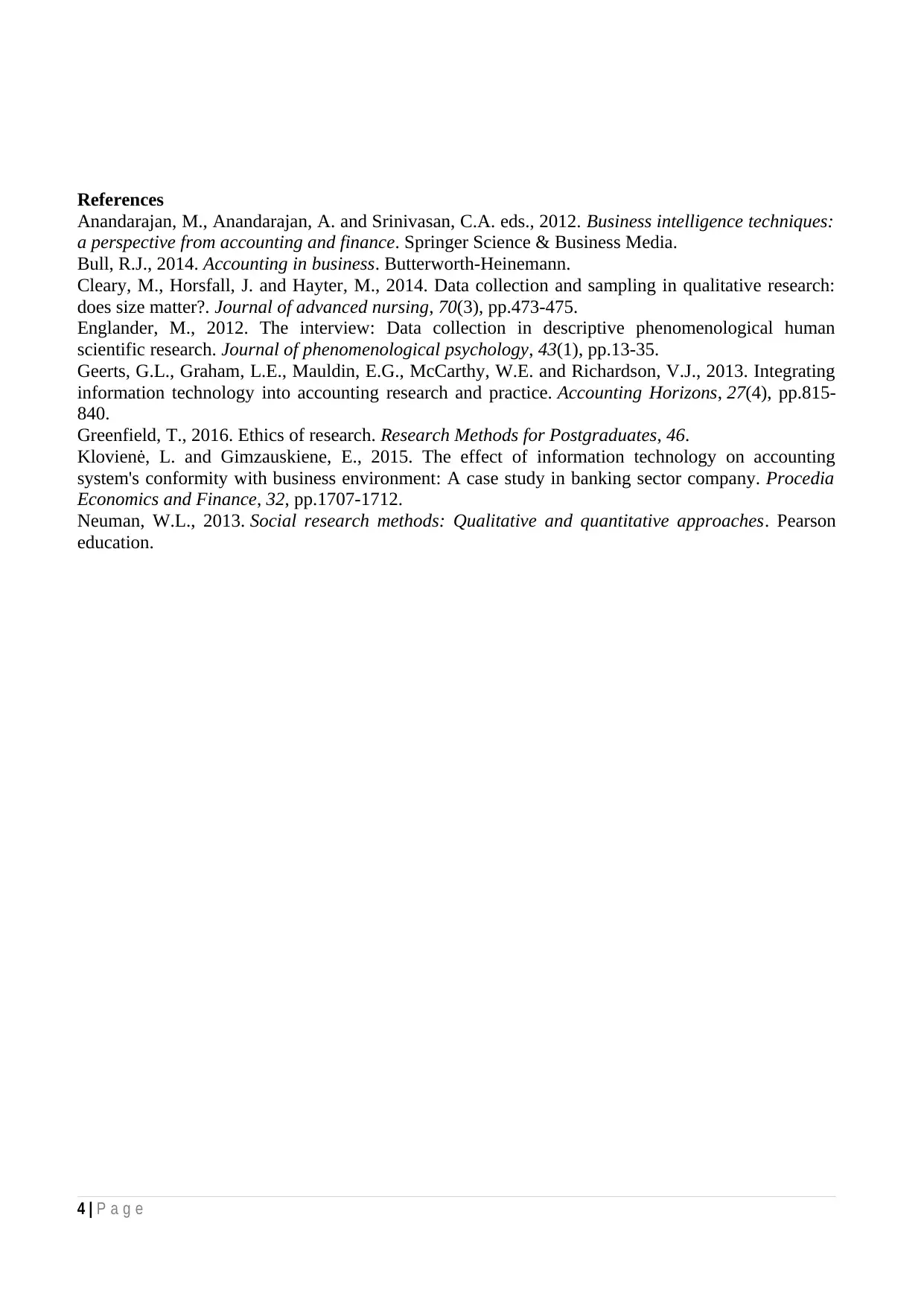BUS707 Research Plan: Impact of Technology on Accounting in Australia
VerifiedAdded on 2023/06/10
|4
|1463
|65
Project
AI Summary
This research plan explores the impacts and significance of technology implementation in accounting and finance, particularly within the Australian commercial framework. It addresses the increasing integration of technology in accounting practices, such as cloud computing and accounting software. The primary research question focuses on the implications of technology implementations in Australian commercial activities. Secondary questions delve into the ways technology is incorporated, its advantages and costs, and future implications. The research aims to study the significance of technological development in accounting, emphasizing Australian businesses. Data will be collected through surveys of accounting professionals and secondary sources to compare observations and perceptions. Ethical considerations include random sampling, informed consent, and unbiased analysis. References to relevant articles are included to support the literature review.

Name : ________________________________________________
Student ID : ____________________________________________
Proposed Research Title:
Impacts and Significance of Technology Implementation in Accounting and Finance
Client Organisation (if applicable)
Not Applicable
Research Background
Accounting and financial reporting, in the contemporary period, refers to the
practices of recording transactions, financial information, auditing, analyzing the
different financial activities and performances of different organizations, having
immense significance, especially in the global commercial and business framework
(Anandarajan, Anandarajan and Srinivasan, 2012). In the contemporary global
commercial sceanrio, with the increase in the integration, inclusiveness as well as
interconnectedness of the business and trading framework of different countries,
primarily owing to events like that of Globalization, liberalisation as well as changes in
the activities of the government across different countries, the accounting and financial
reporting activities have become immensely important for ensuring high profitability,
prosperity and sustenance of the business organizations in increasingly complex
operational framework (Bull, 2014).
The global business scnearios have also undergone significant changes in their
operational framework, attributing to the considerable progresses in the technological
and infrastructural aspects. The progress in the technological frameworks have
influenced all the operations of businesses considerably and the aspects of finance and
accounting is no exception (Geerts et al., 2013). With time, the accounting and financial
activities, across the globe, have experienced considerable modifications with the
incorporation of technological developments in these domains, especially in the domains
of trade and commerce. Technological incorporations have been taking place in
accounting practices, in the forms of cloud computing, mobile accounting, accounting
and tax softwares, OCR technologies and similar phenomena.
Research Problem
Keeping the aspects of incorporation and inclusion of technological progresses
and developments in the accounting and financial aspects of businesses across the global
commercial framework, it becomes immensely crucial to study the implications of such
inclusions and incorporations in the aspects of accounting practices and the ways in
which different technological aspects are implemented in the accounting practices in
different commercial organizations, especially in the commercial domains of one of the
1 | P a g e
Student ID : ____________________________________________
Proposed Research Title:
Impacts and Significance of Technology Implementation in Accounting and Finance
Client Organisation (if applicable)
Not Applicable
Research Background
Accounting and financial reporting, in the contemporary period, refers to the
practices of recording transactions, financial information, auditing, analyzing the
different financial activities and performances of different organizations, having
immense significance, especially in the global commercial and business framework
(Anandarajan, Anandarajan and Srinivasan, 2012). In the contemporary global
commercial sceanrio, with the increase in the integration, inclusiveness as well as
interconnectedness of the business and trading framework of different countries,
primarily owing to events like that of Globalization, liberalisation as well as changes in
the activities of the government across different countries, the accounting and financial
reporting activities have become immensely important for ensuring high profitability,
prosperity and sustenance of the business organizations in increasingly complex
operational framework (Bull, 2014).
The global business scnearios have also undergone significant changes in their
operational framework, attributing to the considerable progresses in the technological
and infrastructural aspects. The progress in the technological frameworks have
influenced all the operations of businesses considerably and the aspects of finance and
accounting is no exception (Geerts et al., 2013). With time, the accounting and financial
activities, across the globe, have experienced considerable modifications with the
incorporation of technological developments in these domains, especially in the domains
of trade and commerce. Technological incorporations have been taking place in
accounting practices, in the forms of cloud computing, mobile accounting, accounting
and tax softwares, OCR technologies and similar phenomena.
Research Problem
Keeping the aspects of incorporation and inclusion of technological progresses
and developments in the accounting and financial aspects of businesses across the global
commercial framework, it becomes immensely crucial to study the implications of such
inclusions and incorporations in the aspects of accounting practices and the ways in
which different technological aspects are implemented in the accounting practices in
different commercial organizations, especially in the commercial domains of one of the
1 | P a g e
Paraphrase This Document
Need a fresh take? Get an instant paraphrase of this document with our AI Paraphraser

most technologically as well as economically progressive nations across the world,
Australia (Klovienė and Gimzauskiene, 2015).
Primary Research Question
The concerned research proposes to explore the primary question which is as follows:
What are the significances and implications of technology implementations in
accounting and financial activities in commercial framework of Australia?
Secondary Research Questions
Keeping the primary research question in consideration, the secondary research
questions for the concerned research are as follows:
a. In what ways are technological developments being incorporated in the accounting
activities of businesses in Australia?
b. What are the advantages of implementing technological innovations in accounting
activities?
c. What are the costs of implementing technological innovations in accounting
activities?
e. What are the future implications of incorporation of technology in accounting
practices in business organizations?
Research Aim and Objectives
The proposed research primarily aims to study the significance of technological
development in the field of accounting activities in businesses and the significance of
the same, emphasizing on the businesses in Australia. By studying the limitations
experienced by the business organizations in the country, the concerned research also
tries to explore the ways in which the limitations found can be mitigated, thereby
predicting the future implications of technological implementations in the accounting
practices in Australian commercial scenario.
Keywords for Literature Review
Keywords: Accounting practices, accounts and finance, accounting in businesses,
accounting in Australia, technological developments in accounting, accounting and
technology, technological implementations in accounting practices, influences of
technology in business accounting, pros and cons of technology in accounting in
business, future of technology in accounting practices
Publication details of relevant articles for literature review
Güney, A., 2014. Role of technology in accounting and e-accounting. Procedia-Social
and Behavioral Sciences, 152, pp.852-855.
Hilton, R.W. and Platt, D.E., 2013. Managerial accounting: creating value in a
dynamic business environment. McGraw-Hill Education.
Lim, F.P.C., 2013. Impact of information technology on accounting systems. Asia-
pacific Journal of Multimedia Services Convergent with Art, Humanities, and
Sociology, 3(2), pp.93-106.
2 | P a g e
Australia (Klovienė and Gimzauskiene, 2015).
Primary Research Question
The concerned research proposes to explore the primary question which is as follows:
What are the significances and implications of technology implementations in
accounting and financial activities in commercial framework of Australia?
Secondary Research Questions
Keeping the primary research question in consideration, the secondary research
questions for the concerned research are as follows:
a. In what ways are technological developments being incorporated in the accounting
activities of businesses in Australia?
b. What are the advantages of implementing technological innovations in accounting
activities?
c. What are the costs of implementing technological innovations in accounting
activities?
e. What are the future implications of incorporation of technology in accounting
practices in business organizations?
Research Aim and Objectives
The proposed research primarily aims to study the significance of technological
development in the field of accounting activities in businesses and the significance of
the same, emphasizing on the businesses in Australia. By studying the limitations
experienced by the business organizations in the country, the concerned research also
tries to explore the ways in which the limitations found can be mitigated, thereby
predicting the future implications of technological implementations in the accounting
practices in Australian commercial scenario.
Keywords for Literature Review
Keywords: Accounting practices, accounts and finance, accounting in businesses,
accounting in Australia, technological developments in accounting, accounting and
technology, technological implementations in accounting practices, influences of
technology in business accounting, pros and cons of technology in accounting in
business, future of technology in accounting practices
Publication details of relevant articles for literature review
Güney, A., 2014. Role of technology in accounting and e-accounting. Procedia-Social
and Behavioral Sciences, 152, pp.852-855.
Hilton, R.W. and Platt, D.E., 2013. Managerial accounting: creating value in a
dynamic business environment. McGraw-Hill Education.
Lim, F.P.C., 2013. Impact of information technology on accounting systems. Asia-
pacific Journal of Multimedia Services Convergent with Art, Humanities, and
Sociology, 3(2), pp.93-106.
2 | P a g e

Tayeh, M., Al-Jarrah, I.M. and Tarhini, A., 2015. Accounting vs. market-based
measures of firm performance related to information technology
investments. International Review of Social Sciences and Humanities, 9(1), pp.129-145.
Data Collection Plan
For the research to be robust, it is of immense importance to collect and use relevant data
and evidences for the purpose of analysis and interpretation of significant occurences. For the
concerned research, both primary as well as secondary data will be collected (Neuman, 2013).
The primary data will be collected from a selected sample of respondents consisting of managers
as well as accounting professionals associated with different business organizations in Australia,
with the help of survey questionnaires containing close-ended as well as open-ended questions, in
order to capture their perceptions regarding different aspects of implementation of technology in
the accounting aspects of business organizations in the concerned country (Cleary, Horsfall and
Hayter, 2014).
On the other hand, secondary is proposed to be collected from different authentic sources
(the data nature being both qualitative as well as quantitative) so as to observed the trends in the
operational frameworks of businesses in Australia as well as in the overall global business
scneario, before and after the implementations of different accounting related technologies in the
business organizations. This will help the proposed research to compare the actual observations
with those of the individual perceptions of the selected respondents for the research (Englander,
2012).
Ethical Consideration
For any research to be robust and contributing to the society in general, it is of immense
importance to carry out the research in an ethical framework, abiding by the norms of the ethical
boards of the concerned university under which the researh is propsoed to be carried out. Keeping
this into consideration, the proposed research aims to maintaing the following ethical aspects for
carrying out the different research related activities:
a. The respondents will be selected with the help of random sampliing so as to remove any
intended or unintended bias in the aspects of sample selection.
b. The interviews with the respondents will be done only after receiving consent from them in
written form and their responses will also be recorded after getting their consent.
c. The secondary data will be collected from authentic sources and peer reviewd journals to
adhere to higher quality and relevance of the data (Greenfield, 2016).
d. All the analysis and interpretation will be done and the results of the analysis will be published
without any personal or intended bias, to maintain the quality and authenticity of the proposed
research.
3 | P a g e
measures of firm performance related to information technology
investments. International Review of Social Sciences and Humanities, 9(1), pp.129-145.
Data Collection Plan
For the research to be robust, it is of immense importance to collect and use relevant data
and evidences for the purpose of analysis and interpretation of significant occurences. For the
concerned research, both primary as well as secondary data will be collected (Neuman, 2013).
The primary data will be collected from a selected sample of respondents consisting of managers
as well as accounting professionals associated with different business organizations in Australia,
with the help of survey questionnaires containing close-ended as well as open-ended questions, in
order to capture their perceptions regarding different aspects of implementation of technology in
the accounting aspects of business organizations in the concerned country (Cleary, Horsfall and
Hayter, 2014).
On the other hand, secondary is proposed to be collected from different authentic sources
(the data nature being both qualitative as well as quantitative) so as to observed the trends in the
operational frameworks of businesses in Australia as well as in the overall global business
scneario, before and after the implementations of different accounting related technologies in the
business organizations. This will help the proposed research to compare the actual observations
with those of the individual perceptions of the selected respondents for the research (Englander,
2012).
Ethical Consideration
For any research to be robust and contributing to the society in general, it is of immense
importance to carry out the research in an ethical framework, abiding by the norms of the ethical
boards of the concerned university under which the researh is propsoed to be carried out. Keeping
this into consideration, the proposed research aims to maintaing the following ethical aspects for
carrying out the different research related activities:
a. The respondents will be selected with the help of random sampliing so as to remove any
intended or unintended bias in the aspects of sample selection.
b. The interviews with the respondents will be done only after receiving consent from them in
written form and their responses will also be recorded after getting their consent.
c. The secondary data will be collected from authentic sources and peer reviewd journals to
adhere to higher quality and relevance of the data (Greenfield, 2016).
d. All the analysis and interpretation will be done and the results of the analysis will be published
without any personal or intended bias, to maintain the quality and authenticity of the proposed
research.
3 | P a g e
⊘ This is a preview!⊘
Do you want full access?
Subscribe today to unlock all pages.

Trusted by 1+ million students worldwide

References
Anandarajan, M., Anandarajan, A. and Srinivasan, C.A. eds., 2012. Business intelligence techniques:
a perspective from accounting and finance. Springer Science & Business Media.
Bull, R.J., 2014. Accounting in business. Butterworth-Heinemann.
Cleary, M., Horsfall, J. and Hayter, M., 2014. Data collection and sampling in qualitative research:
does size matter?. Journal of advanced nursing, 70(3), pp.473-475.
Englander, M., 2012. The interview: Data collection in descriptive phenomenological human
scientific research. Journal of phenomenological psychology, 43(1), pp.13-35.
Geerts, G.L., Graham, L.E., Mauldin, E.G., McCarthy, W.E. and Richardson, V.J., 2013. Integrating
information technology into accounting research and practice. Accounting Horizons, 27(4), pp.815-
840.
Greenfield, T., 2016. Ethics of research. Research Methods for Postgraduates, 46.
Klovienė, L. and Gimzauskiene, E., 2015. The effect of information technology on accounting
system's conformity with business environment: A case study in banking sector company. Procedia
Economics and Finance, 32, pp.1707-1712.
Neuman, W.L., 2013. Social research methods: Qualitative and quantitative approaches. Pearson
education.
4 | P a g e
Anandarajan, M., Anandarajan, A. and Srinivasan, C.A. eds., 2012. Business intelligence techniques:
a perspective from accounting and finance. Springer Science & Business Media.
Bull, R.J., 2014. Accounting in business. Butterworth-Heinemann.
Cleary, M., Horsfall, J. and Hayter, M., 2014. Data collection and sampling in qualitative research:
does size matter?. Journal of advanced nursing, 70(3), pp.473-475.
Englander, M., 2012. The interview: Data collection in descriptive phenomenological human
scientific research. Journal of phenomenological psychology, 43(1), pp.13-35.
Geerts, G.L., Graham, L.E., Mauldin, E.G., McCarthy, W.E. and Richardson, V.J., 2013. Integrating
information technology into accounting research and practice. Accounting Horizons, 27(4), pp.815-
840.
Greenfield, T., 2016. Ethics of research. Research Methods for Postgraduates, 46.
Klovienė, L. and Gimzauskiene, E., 2015. The effect of information technology on accounting
system's conformity with business environment: A case study in banking sector company. Procedia
Economics and Finance, 32, pp.1707-1712.
Neuman, W.L., 2013. Social research methods: Qualitative and quantitative approaches. Pearson
education.
4 | P a g e
1 out of 4
Related Documents
Your All-in-One AI-Powered Toolkit for Academic Success.
+13062052269
info@desklib.com
Available 24*7 on WhatsApp / Email
![[object Object]](/_next/static/media/star-bottom.7253800d.svg)
Unlock your academic potential
Copyright © 2020–2025 A2Z Services. All Rights Reserved. Developed and managed by ZUCOL.





